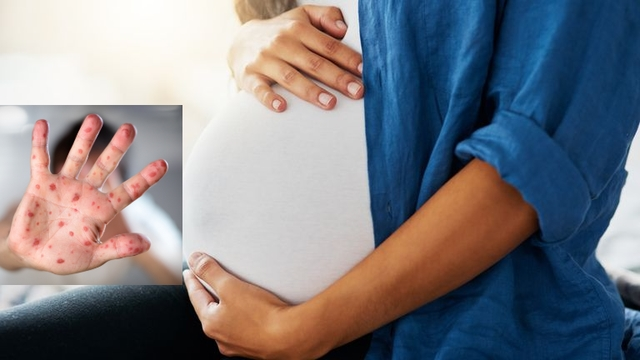Many pregnant mothers wonder and worry whether hand, foot and mouth disease is dangerous when pregnant women come into contact with children with the disease?

1. What is hand, foot and mouth disease?
Hand, foot and mouth disease is a common, highly contagious childhood infection caused by enteroviruses; including coxsackievirus. Hand, foot and mouth disease is most common in young children and typically causes fever, painful sores in the mouth, and a red, blister-like rash on the palms of the hands and soles of the feet but is usually not serious.
Most children with hand, foot and mouth disease are benign and can be completely cured. However, if the disease is not detected and treated promptly, it can lead to very dangerous complications such as meningitis, encephalitis, heart muscle damage... seriously affecting the health of young children.
Hand, foot and mouth disease is less common in adults because adults often have antibodies from previous viral infections.
2. Does hand, foot and mouth disease pose a risk to pregnancy?
Ms. H.D is a preschool teacher in (Da Kao Ward, District 3, Ho Chi Minh City) who is 9 weeks pregnant and is very worried about being infected with hand, foot and mouth disease. Because she is in the first 3 months of pregnancy, Ms. D is worried that if she is in frequent contact with young children, including children with hand, foot and mouth disease, will she be at risk of getting hand, foot and mouth disease and affecting her pregnancy?
Similar to Ms. H.D. is the case of Ms. KT (Thu Dau Mot, Binh Duong). Since reading the information that the virus causing hand, foot and mouth disease is a type that can easily cause complications, Ms. T is very scared because she is 22 weeks pregnant. If she is unlucky enough to get infected, could it cause dangerous complications for both mother and child?
Responding to these concerns, Associate Professor, Dr. Nguyen Manh Thang - Head of the Department of Obstetrics, Central Obstetrics Hospital said that there is currently no research showing that hand, foot and mouth disease is dangerous for the fetus when the mother is pregnant. In Vietnam, there has also been no recorded case of hand, foot and mouth disease in pregnant women that can cause dangerous effects on the fetus.
If the mother contracts the disease shortly before giving birth, this can lead to infection of the baby, but this is very rare.
There is no evidence that the virus that causes hand, foot and mouth disease in adults can cause any particular adverse effects on pregnancy, such as miscarriage, stillbirth or birth defects. Therefore, if a pregnant woman has contact with a child with hand, foot and mouth disease and suspects she has the disease, there is no need to worry too much.
However, it is important to note that infants under 1 month of age are particularly vulnerable as they can develop severe symptoms due to their lack of a strong immune system.
3. Preventing hand, foot and mouth disease in pregnant women
According to Associate Professor, Dr. Nguyen Manh Thang, hand, foot and mouth disease is commonly found in young children, but there is a high possibility that pregnant mothers will be exposed to the virus while caring for sick children. If pregnant mothers are often near young children with hand, foot and mouth disease or have contact with children with hand, foot and mouth disease, they should take the following measures:
- Wash your hands after each contact with a child with hand, foot and mouth disease with soap and antiseptic solution, before cooking or eating, and after using the toilet.
- Clean contaminated surfaces and objects (including toys) first with soap and water, then disinfect with diluted chlorine bleach.
- Pregnant mothers should wear a mask if they come into contact with their children or young children who have a runny nose, cough, or sneeze because the virus will affect pregnant mothers, no matter how often they wash their hands.
- Try to keep the child's blisters from breaking, especially do not squeeze the blisters because blisters can easily spread germs.
- Avoid sharing food, drinks, personal hygiene items such as towels, washing machines and toothbrushes, anything that comes into contact with saliva. The virus lives in saliva, so not kissing an infected child will help reduce the risk of infection.
In addition, it is important to note that dehydration increases the risk of infection during pregnancy, which can easily cause complications. Therefore, pregnant women should drink plenty of water even if they do not have any symptoms of hand, foot and mouth disease.
Note that the virus can stay in the stool for several weeks after the rash clears, so take precautions when changing your baby's diaper.
It is best for pregnant women to avoid contact with children with hand, foot and mouth disease if they are pregnant, especially in the later stages of pregnancy. If a pregnant woman has been exposed to someone with hand, foot and mouth disease and develops symptoms including fever, flu-like symptoms, skin rash, blisters or mouth ulcers, she should see a doctor immediately so that the infection can be diagnosed and treated promptly.
According to Health and Life